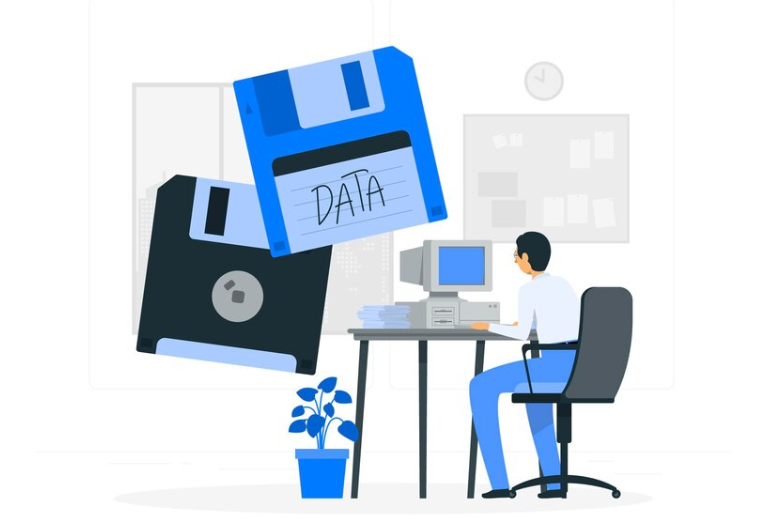Data is frequently referred to as the new oil in the digital world because it is a potent resource that powers technology, businesses, and decision-making. However, data can become toxic when stored for an extended period of time, much like oil. The most important question that organizations need to address is: How long can you store data for?
Although storing data indefinitely might seem convenient, security, ethical, and legal considerations necessitate a more calculated approach. Understanding the regulations is crucial to preventing compliance infractions, security threats, and needless expenses, regardless of whether you’re a company managing client records, a government organization handling sensitive data, or an individual protecting personal information.
Comprehending Data Retention: The Lawful Structure
GDPR and the Storage Limitation Principle
The General Data Protection Regulation (GDPR) is one of the most important data protection laws. Instead of establishing a set retention period, it upholds the rule that personal information shouldn’t be retained for longer than is required for its intended use.
| GDPR Rule | Key Requirement |
|---|---|
| Storage Limitation | Data must be deleted when no longer needed for its intended use. |
| Retention Schedules | Organizations must define and document retention periods. |
| Regular Reviews | Stored data must be audited and updated or removed as necessary. |
| Secure Deletion | Data must be erased properly to prevent unauthorized access. |
This principle ensures that personal data isn’t stored indefinitely without justification, reducing the risks of misuse, data breaches, and legal liabilities.
How Much Time Can You Keep Data? Factors Affecting Retention Times
- Industry and Legal Regulations
Specific data retention policies are set by various nations, sectors, and regulatory agencies. The type of data, its intended use, and legal requirements all affect how long it must be retained.
| Data Type | Retention Period | Reason |
|---|---|---|
| Employment Records | 3-7 years after termination | Labor law compliance |
| Financial Transactions | 5-10 years | Tax, audit, and fraud prevention |
| Medical Records | 5-30 years | Patient care & legal requirements |
| Marketing Data | Until purpose is fulfilled | GDPR mandates timely deletion |
| Criminal & Law Enforcement Data | Indefinite (case-dependent) | National security & investigations |
For example, payroll data must be kept on file by HR departments for tax purposes, but marketing-related customer data must be removed when it is no longer needed. Serious fines and harm to one’s reputation may arise from breaking these retention guidelines.
- Needs for Operations and Business
Businesses need to think about operational efficiency in addition to compliance. Data retention that is out-of-date, redundant, or irrelevant results in increased security risks, slower performance, and higher storage costs.
For instance, keeping customer records that aren’t being used for years may seem innocuous, but it gives hackers a larger attack surface. Organizations should instead employ data minimization techniques to make sure they only keep the information that is absolutely necessary.
- Risks to Privacy and Cybersecurity
The risk of identity theft, cyberattacks, and unauthorized access increases with the length of time data is stored. Because businesses typically concentrate their security efforts on operational systems rather than legacy archives, older data is frequently less secure.
Businesses can reduce their vulnerability to breaches and adhere to privacy laws by implementing encryption techniques and defining explicit deletion policies.
Exceptions: When Is It Possible to Keep Data Longer?
Some situations permit longer retention periods, even though the majority of data should be erased once its purpose has been completed:
Historical and Scientific Research: GDPR allows for the long-term storage of anonymized data for public policy, technology, and medical research.
Legal Disputes and Audits: If data is required for ongoing litigation, regulatory audits, or investigations, businesses may keep it.
Public Archives and National Security: For the long-term benefit of the country, government organizations maintain historical records, census data, and classified materials.
To preserve individual privacy in these situations, data must be encrypted or anonymized.
Top Techniques for Managing Data Retention
Organizations should adhere to these crucial data retention strategies in order to guarantee compliance, security, and efficiency:
Clearly define your retention policies.
- Give distinct deadlines for various data kinds.
- Schedules for retention should be in line with business and legal requirements.
- Audit and Examine Stored Data Frequently
To determine whether data is still relevant, conduct reviews every year or every six months.
Put automated systems in place to identify unnecessary or out-of-date data.
Employ Safe Deletion Techniques
- Make use of data erasure methods like wiping, encryption, or shredding.
- Assure adherence to the “right to be forgotten” clause of the GDPR.
- Data Anonymization for Long-Term Storage
Use encrypted or randomized values in place of personally identifiable information (PII).
To protect privacy without sacrificing usability, use data masking techniques.
Educate Staff on Data Handling Procedures
Educate people on cybersecurity best practices and compliance.
Promote a responsible data management culture.
Emerging Trends in the Future of Data Retention
Organizations’ data management and storage practices are changing as a result of new laws and technologies and growing concerns about data privacy.
- Data Management Driven by AI
Tools driven by AI are being created to detect redundant records, automate data retention, and guarantee compliance. When data is no longer required, these systems will automatically delete it after analyzing usage trends.
- Using Blockchain to Archive Data Securely
Important documents will always be safe thanks to tamper-proof, immutable storage solutions made possible by blockchain technology. This is especially helpful for legal paperwork, medical records, and financial transactions.
- Tougher International Privacy Regulations
Governments around the world are imposing stricter limitations on retention periods in response to growing concerns about data misuse. More real-time deletion policies and more regulatory pressure on businesses to demonstrate compliance are to be expected.



1 Comment
Your point of view caught my eye and was very interesting. Thanks. I have a question for you.